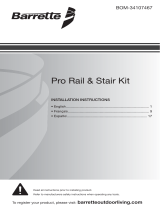
4
2.
3.
2.
1.
Option A. For 2.5" aluminum posts only – Take
mounting jig out of rail kit and align on top of
trim as shown. Pre-drill two holes for bottom
bracket. Measure 32" up from the top of the trim
and make a mark. Align bottom of jig with the
mark and pre-drill 4 holes (Fig 7).
Option B. Remove template from rail kit. Align
template with the base trim and post. Secure
template in place using a piece of tape. Pre-drill
through the desired marked locations on the
template using a
1
⁄8
" drill bit.
Fig. 8
Top Top
BracketBracket
Bottom Bottom
BracketBracket
Fig. 7
Cut Rails to Length (Top & Bottom Rails, Top Rail Cap):
a. Place bottom rail across post opening leaving
equivalent spacing from last baluster to post on
each end. Make sure there is even spacing from
baluster hole to post (Fig. 1)
b. Mark rail ush to post.
c. From marked lines, mark additional parallel line
1
⁄4
" from rst line to allow for bracket clearance
(Fig. 2).
d. Align top rail and top rail cap with bottom rail
and mark all before cutting to size. Then cut all
to same length with a ne-tooth carbide blade.
(Fig. 3).
Assemble Railing Section:
a. Place top and bottom rail on a smooth, at and
clean surface. Then, align the top and bottom
rails so that the ridges inside the rails are
oriented on the same side (Fig. 4).
NOTE:
There are two (2) ridges on both sides that
are different sizes.
RAIL INSTALLATION - FOR SQUARE AND/OR SPIRAL BALUSTERS
Fig. 1
Fig. 3
Fig. 2
1
⁄4
"
Tape
Measure
Fig. 4
Top Rail Opening Facing UpTop Rail Opening Facing Up
2 Small Ridges2 Small Ridges
2 Small Ridges2 Small Ridges
2 Large Ridges2 Large Ridges
2 Large Ridges2 Large Ridges
Bottom Rail Opening Facing DownBottom Rail Opening Facing Down
Remove template/jig, align brackets (Fig. 8) with
the holes ensuring the brackets are square, and
fasten brackets in place using the 1
1
⁄2
" screws
provided.
NOTE:
Mounting hardware included is comprised of
(13) 1
1
⁄2
" screws and (4) 1
5
⁄8
" screws. Be sure to
use 1
1
⁄2
" screws when installing brackets and
keep longer 1
5
⁄8
" screws for installing top rail.
1
5
⁄8
" are specically designed to be longer and
lock top rail in place at the end of installation.














